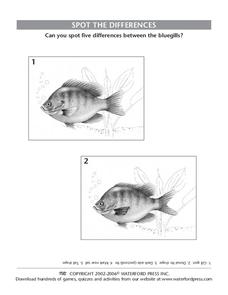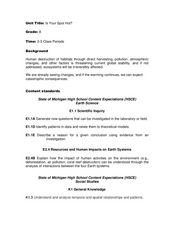University of Minnesota
Blind Spot
Your eyes each work independently, so how do we only see one image? The quick hands-on experiment encourages young scientists to test their blind spots on each eye individually. After learning where the blind spot is and why it exists,...
Curated OER
Spot the Differences Between Two Pictures of Crayfish
In this comparison worksheet, students examine two pictures of crayfish to find five differences. They check their work by using the word bank at the bottom of the page.
Curated OER
Spot the Differences
In this science and visual discrimination worksheet, students examine 2 nearly identical pictures of a bluegill fish. Students tell or write the five differences between them.
Curated OER
Spot the Differences Between The Two Black-Shouldered Kites
In this comparison worksheet, students examine two black-line drawings of black-shouldered kites to find six differences between the two pictures. They check their answers with the word bank at the bottom of the page.
Curated OER
Spot the Differences Between Two Wildlife Pictures
In this wildlife comparison worksheet, students examine two pictures of animals in a mountain setting to find 10 differences. They check their work with the solution at the bottom of the page.
Glynn County School System
Multi-Wavelength Astronomy
Take a look at astronomy through the light lens. From radio to gamma, light waves exist in every corner of the universe. An enlightening PowerPoint presentation gives an overview of the different categories of light and then discusses...
Curated OER
Spot the Differences- Comparing Two Pictures of Cutthroat Trout
In this science worksheet, students attempt to find 6 differences between two pictures of cutthroat trout. They check their work by looking at the word bank at the bottom of the page.
Curated OER
Spot the Differences: Great Blue Herons
For this science and visual discrimination worksheet, young scholars spot 6 differences between the two pictures of the great blue heron.
Curated OER
Spot the Differences-- Animals by the Mountain Lake
In this visual discrimination worksheet, students examine 2 nearly identical pictures of birds and animals in a mountain lake habitat. Students spot 10 differences between the 2 pictures.
Curated OER
Spot the Differences: Gray-Crowned Crane
For this science and visual discrimination worksheet, students examine 2 nearly identical pictures of gray-crowned cranes. Students spot 5 differences between the pictures.
Physics Classroom
Law Enforcement - Refraction
Pupils apply their knowledge of refraction to four different sets of challenges. Each of the first three focus on one variable's impact on the direction of bending. The fourth combines variables for greater challenge.
Curated OER
Spot the Differences: Red Squirrels
In this visual discrimination worksheet, learners study 2 nearly identical pictures of a red squirrel. Students spot five differences between the pictures.
Curated OER
Spot the Differences: Rock Pigeons
In this science and visual discrimination worksheet, learners spot the 5 differences between two nearly identical pictures of rock pigeons.
Curated OER
Spot the Differences
In this spot the difference worksheet, students analyze pictures of two
different waterfowl and marine mammal images to see if they can find ten differences between the
two.
Curated OER
Spot the Differences
In this spot the difference worksheet, pupils analyze two pictures of sea creatures to determine the ten differences between two images.
Curated OER
Is Your Spot Hot?
Eighth graders explore global warming. In this Earth Science lesson plan, 8th graders will look for Harbingers and fingerprints for different areas. The students will identify an area at risk and they will then create a...
Colorado State University
How Does the Earth Cool Itself Off?
Where does all the heat go when the sun goes down? An interesting lesson has learners explore this question by monitoring the infrared radiation emitted over time. They learn that hot spots cool more quickly that cooler spots.
LABScI
Vision Lab: The Eye
Our bodies have some amazing capabilities, but there are some limitations. Explore the limitations of the human eye through the eighth lab activity in a series of 12 biology lessons. Individuals measure their own peripheral vision...
Physics Classroom
Torque-ing About Rotation
Let's talk torque! Science scholars evaluate experimental setups during an interactive from the Rotation and Balance series. Individuals calculate the torque of differently arranged weights to determine the effect they have on a balanced...
Curated OER
Designing a Hiking Trail
Put your students' map skills to the test with this engaging cross-curricular project. Given the task of developing new hiking trails for their local community, young cartographers must map out beginner and intermediate...
University of Colorado
Phases of Charon
Pluto, although no longer considered a planet, has five moons. Pluto's moon, Charon, is the focus of a resource that describes how the moon is viewed from the surface of Pluto. Photos help individuals see how Charon would look at...
Oregon State
World Map of Plate Boundaries
Young geologists piece together the puzzle of plate tectonics in an earth science lesson. Given a physical map of the world, they search for land formations that indicate the location of different types of plate boundaries.
Curated OER
Spot the Differences: Ruby-Throated Hummingbirds
In this science and visual discrimination worksheet, students spot the 6 differences between the 2 pictures of a ruby-throated hummingbird.
Texas State Energy Conservation Office
Investigation: Insulation
Youngsters compare the heat-holding abilities of three different cans by insulating two with different materials and measuring the temperature change of hot water over a 20-minute period.























